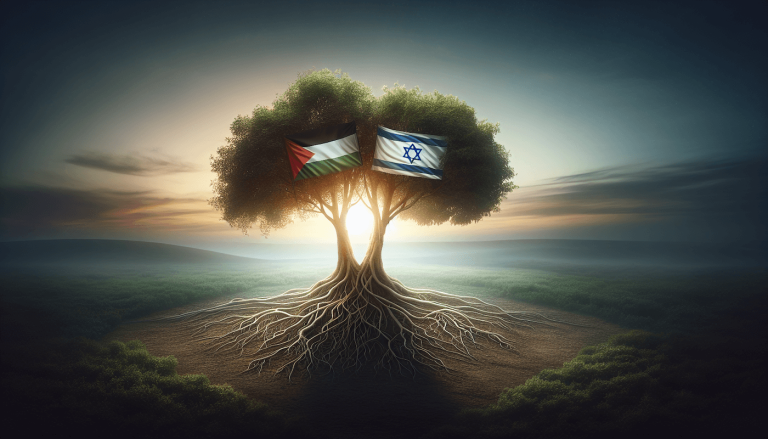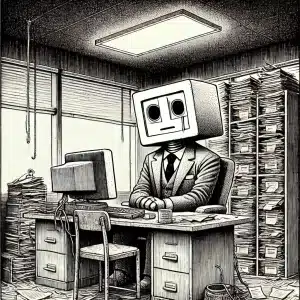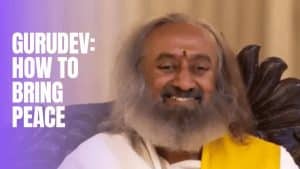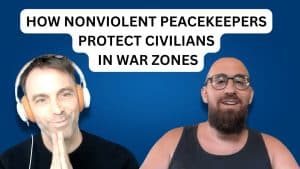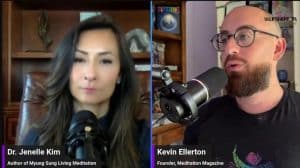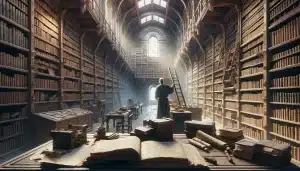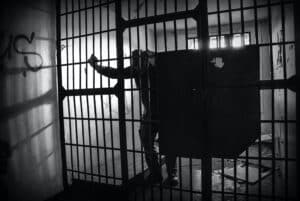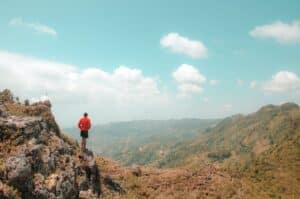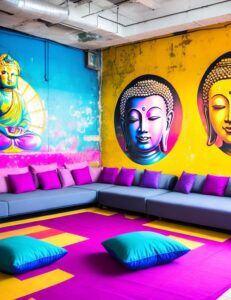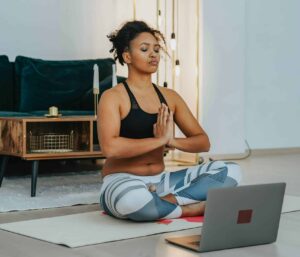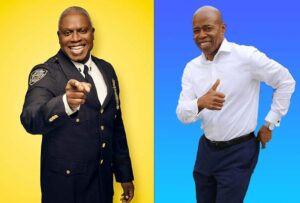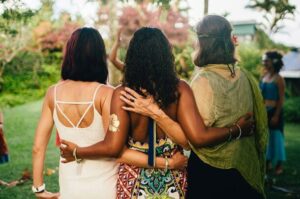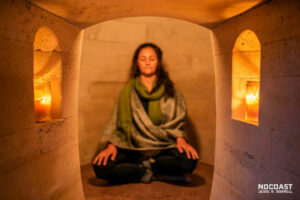My grandmother was a young girl when she was sent to the concentration camps.
She escaped into the forest during a death march to Auschwitz, and survived by eating grass, leaves, and anything else she could find.
Her brothers and sisters were killed, along with her parents, cousins, uncles, aunts, and nearly everyone else she had ever known.
After the war, she took a boat to New York, married a nice man, raised two kids, and lived an idyllic suburban life into her 90s. She never recovered.
Her name was Bella.
The trauma that Bella experienced nearly a century ago is still here, now, trickling down through the generations.
As a child I wondered, how could the world have let this happen? The Rabbis at school answered: “Evil triumphs when good men look on and do nothing.” We were taught to speak up and speak out against evil and oppression in all its forms.
On October 7th, 2023…
I was visiting my parents, in the house next door to where Bella died, for the Jewish holiday of Sukkot.
On Sukkot, everyone turns off their TVs and electronics, and we eat together in a cute little hut in the backyard, with a thatched bamboo roof and colorful fairy lights. It’s a time for families to come together, get back to nature a bit (even if it’s just in the backyard), and be truly present with one another.
In the midst of these sacred moments, rumors began to spread through the community that something horrific was happening in Israel.
I checked my phone, and saw the brief, urgent WhatsApp messages from my friend “Dave,” a small business owner in Tel Aviv.
“I’m going into war now.
We are being invaded.
I’ve been called up.
They’re raping women.
Killed old ladies and children.
What country can take this?
We need to get the hostages.
And revenge for what they did.
Have your thoughts with me Kevin.”
I knew right away that this was going in a dark direction. The IDF would not be able to rescue the hostages and destroy Hamas without killing thousands of innocent civilians, traumatizing hundreds of thousands of children, and creating a whole new generation of terrorists.
I tried to talk sense into Dave, but his ears were ringing with rage, and he could no longer hear the voice of peace. He was overcome by hatred and desire for revenge. These are the emotions that Dave carried with him as he stormed, alongside hundreds of thousands of his brothers and sisters, into Gaza.
Dave, too, grew up with the knowledge that evil triumphs when good people sit by in silence. It was from this shared understanding that Dave asked me to raise my voice, to use my platform, to scream to the world about what was going on.
I meditated for three days on Dave’s request, contemplating what actions I could take that would lead toward peace, that would reduce the suffering for everyone involved.
I tried to get in touch with the peace at the center of the Universe, but something was blocking the way.
I breathed deep and slow to calm my emotions.
I breathed deep and fast to bring them up again.
With my eyes closed, I saw the faces of parents and children, the unbearable suffering as their lives came to an end in horrific moments of unspeakable violence that no conscious being should ever be made to endure.
The emotions burst forth in shuddering sobs, flowing tears. I screamed into a pillow so that nobody would hear.
On October 10th, 2023, I published an Open Letter To Both “Sides”. It’s not what Dave had wanted me to write, but I hope that he will look back upon it, some day, with wisdom and understanding.
—
Over the following months, I published many posts for peace, nonviolence, empathy, compassion and understanding.
I saw many other meditators posting for peace, inspired by great nonviolent leaders like Mahatma Gandhi and MLK Jr… and was appalled to see them attacked on social media, by mobs of people who strongly identified with the labels “Pro-Israel” and “Pro-Palestine.”
While I still strongly believe that building bridges (rather than taking sides) is the only way to truly move toward peace, I also wanted to understand the perspectives of those who believe otherwise.
So I dived into a months-long rabbit hole of research, and my eyes began to open as I learned things that I had never known about the true history of Israel and Palestine.
Growing Up In The Jewish Experience
Growing up in a Modern Orthodox Jewish family in New York, I thought I knew all about the history of Israel & Palestine.
In New York, I attended a Modern Orthodox elementary school and a religious Zionist high school. At 17, I moved to Jerusalem to study at a black-hat yeshiva & rabbinical school (from which I was excommunicated for questioning the dogma of Judaism… full story in my new book, Awakening). The history I heard, and experienced, in each and every place was the same:
DISCLAIMER: I am not claiming that the historical narrative below is ‘The Truth.’ I am just telling the story of my own lived experience of growing up in a Jewish family in New York and Israel.
Thousands of years ago, our ancestors lived in Israel. They were exiled by the Romans, doomed to wander the Earth as a people without a land, persecuted for millennia by anti-semitic groups in their host countries. This persecution culminated in the pogroms and the Holocaust, which resulted in the deaths of more than two-thirds of the Jews in Europe. The nations of the world saw their suffering, and the Jews were finally allowed to return to their homeland… a sparsely-populated desert land that had fallen into ruin in the absence of its rightful owners, the Jewish People.
Mark Twain traveled to The Holy Land in the late 1800s, and described it as: “a desolate country… a silent, mournful expanse.” Israel was “a land without a people, for a people without a land.” And as the Jews returned home, the desert began to bloom.
In 1948, the State of Israel was born. Israel was immediately attacked by surrounding Arab countries, but, in the greatest miracle of the modern age, the Jews fought off the invaders, and celebrated their independence in the wake of the war.
Arab states kept attacking for decades, but time and again, Israel repelled the invaders. Israel captured massive areas of land during these defensive wars, but gave it back to their neighbors in exchange for peace (as they did with Egypt in 1979).
Israel took the high road at every turn, but an Arab extremist group called “Palestinians” kept blowing up innocent Israeli men, women, children and babies, while shouting “Allahu Akbar” (“God is the greatest”) in a horrific Jihadist campaign of terror, to recapture the land for Islam and the glory of Allah.
Everyone I knew had a story of a friend or family member who was killed, injured, or traumatized in a terror attack. But Israelis rose above their desire for revenge, elected left-wing “peaceniks” like Yitzchak Rabin and Shimon Peres, and tried with all their might to make peace with the Palestinians.
At The Oslo Accords in the 1990s, Rabin and Peres offered to give the Palestinians more than 90% of the land that they wanted… but shockingly, Palestinian leader Yasser Arafat refused. When Arafat walked away from the negotiations in Oslo, U.S. President Bill Clinton told him, “You are leading your people, and the region, to a catastrophe.” Since then, there have been hundreds of terrorist attacks and multiple intifadas (uprisings), in which Palestinians kill innocent Israeli men, women, and children.
Even in the face of this violence and injustice, Israel continues to strive for peace. Israel ended the occupation of Gaza in 2005, dragging Israeli families out of their homes in order to return Gaza to the Palestinians. Instead of responding in kind, Gazans elected Hamas – a terrorist organization officially committed to the annihilation of the State of Israel – which swept through Gaza, murdered their political rivals, as well as any peace activists and “gay” people they could find, destroyed all the greenhouses and infrastructure that the Jews had built to produce food in Gaza, and have been oppressing the people of Gaza under an authoritarian klepto-theocratic reign of terror ever since.
Hamas trains children to use guns, grenades, and knives, starting from the age of five or six, teaching them that killing Jews is their highest calling in life. Still, the international community (including Israel!) sends huge amounts of humanitarian aid to help the civilians of Gaza… but the money is stolen by Hamas’s leaders – Ismail Haniyeh, Moussa Abu Marzouk, and Khaled Mashaal – who have become billionaires, living in luxury in Qatar while children live in poverty in Gaza. The money they do allow to trickle into Gaza goes to buying weapons and building tunnels for terrorists, instead of aid and infrastructure for civilians. Terrorist groups in Gaza, like Hamas and Islamic Jihad, constantly shoot rockets at Israel, call for cease-fires (and then break them), and commit terror attacks – the largest and most heinous of which occurred on October 7th, 2023.
This was the history of Israel that I heard, from everyone, all around me, as a child, as I was growing up, in every school I went to, and in the ancient streets of Jerusalem.
Of course, I had never spoken with a Palestinian about any of this.
In the Jewish circles in which I was raised, the word “Palestinian” was rarely spoken, and when it was, it carried an energy of distrust, suspicion and fear. Palestinians were dangerous extremists trained from birth to murder Jews. How could I possibly speak with one?
So when Dr. Gabor Mate, a respected figure in the meditation community, a Holocaust survivor and former-Zionist himself, said that he had discovered a darker history of Israel that he had not heard about as a child, I started digging.
I listened to Palestinians describe their experiences in Gaza and the West Bank. I read history books that I had never heard of before. I spoke with as many Palestinians as I could, in order to understand more about their experiences. Some of those conversations are excerpted in the following pages.
Discovering A Parallel Universe: The Palestinian Experience
DISCLAIMER: I am not claiming that the historical narrative below is ‘The Truth.’ I am just summarizing what I have heard from Palestinians about their own lived experiences. I recommend reading and watching their first-hand accounts, in the following pages and on our YouTube channel.
For thousands of years, Muslims, Christians, and Jews lived together in peace in the land of Palestine. There were always people moving in and out in small numbers, and everything was fine.
In the late 1800s and early 1900s, Jewish refugees began flooding into Palestine, driven by persecution in Europe and Zionist ideology. In 1917, British Foreign Secretary Arthur Balfour sent a letter to a wealthy British Zionist named Lord Rothschild, expressing support for “the establishment in Palestine of a national home for the Jewish people.” This letter became known as The Balfour Declaration, and precipitated a massive influx of European Jews into Palestine.
At first, Indigenous Palestinians welcomed the Jewish immigrants with open arms. When huge numbers of immigrants began flooding in, Palestinians objected, but their peaceful protests were ignored and overruled by the Jewish-controlled government that the British were establishing in Palestine.
In 1948, more than 700,000 Palestinians were forced from their homes, and those who did not leave were violently killed. Israelis stole Palestinians’ homes and lands, and did not allow the homeowners to return. To Palestinians, this event was known as The Nakba, or The Catastrophe. Most residents of Gaza and The West Bank are descended from Palestinians who fled their homes in 1948. Many families retain the keys to their homes in the hope that they may one day return. They are still considered refugees, internally displaced in their own land.
Palestinians tried to engage in peace talks, but the Israelis never made reasonable offers. When negotiations were finally looking hopeful, Israeli Prime Minister Yitzchak Rabin was assassinated by a right-wing Israeli extremist. Rabin’s peace agreements were never fulfilled by subsequent administrations.
Since the early 1900s, Palestinians have been marginalized and violently oppressed, more and more, by Zionism and the Jewish-Nationalist Israeli society.
In The West Bank, Israeli “settlers” illegally steal Palestinians’ homes and lands and kill innocent Palestinians. The IDF allows this to happen, and often even helps the settlers. Settlers are allowed to move freely and act with impunity within The West Bank, but Palestinians – to whom The West Bank rightfully belongs – are required to submit to oppressive Israeli security checkpoints when simply trying to move around in their own lands. Palestinian areas of The West Bank are shrinking into fragmented enclaves, separated from one another by Israeli-occupied areas, leading many around the world to describe the situation as “occupation” and “apartheid.” The IDF raids families’ homes at random to keep Palestinians in a state of fear and submission. The IDF bulldozes Palestinian homes, and when the owners apply for permits to rebuild, they are left waiting forever, while settlers’ building permits are granted immediately. Palestinians of all ages (even children and teenagers) are thrown into Israeli prisons without being charged. Many languish in prison for years, at the mercy of the Israeli prison system. These are just a few of the injustices endured by Palestinians in The West Bank at the hands of the Israelis.
The situation in Gaza is even worse. Under siege for decades, Gazans are unable to import the goods that they need, or travel internationally. Many Gazans, and observers around the world, describe Gaza as the world’s largest open-air prison, or concentration camp. When Gazans try to protest peacefully, they are killed by IDF snipers, as in The Great March of Return in 2018.
Israel has been bombing Gaza and oppressing Palestinians in The West Bank for decades, killing thousands of innocent men, women, children, and babies. Many genocide experts around the world consider Israel to be engaging in an ongoing genocide of the Palestinian people. At this point, many young Palestinians feel that they have no choice aside from violent resistance and revolution.
Two Narratives… One Truth?
Clearly, Palestinians and Israelis tell very different stories about the history of the conflict. People on both sides see themselves as “righteous victims” of violence and oppression, which they believe has been perpetrated, wholly and completely, by “the other side.”
Is one side lying, and the other telling the truth? Are there grains of truth (and falsehood) on both sides?
To investigate these questions, I dove into historical documents — congressional speeches, police reports, newspaper articles, and more – from the late 1800s and early 1900s. While today’s “commentators” on CNN, FOX, and yes, even, TikTok, often portray history according to their own agendas, narratives and beliefs… historical documents provide a clearer glimpse into actual events, as they happened.
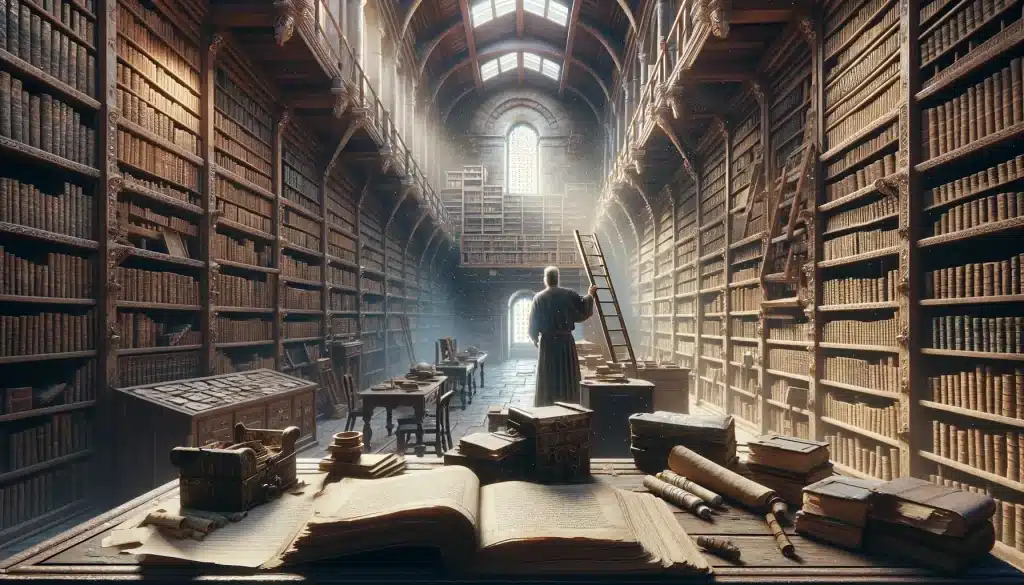
While many of historical details have been debated and obscured for over a century, and many facts are impossible to verify, there are two important facts that must be understood and acknowledged by both sides (and peace activists abroad) in order to move forward toward reconciliation and peace in Israel and Palestine:
1. Humans on both sides have suffered tremendously, and humans on both sides have caused tremendous suffering.
This is not to say that blame and suffering are equal on both sides – only that humans on both sides have sowed the seeds of the violence and oppression that are manifesting today.
To see the roots of Jewish-Israeli culpability (and Arab-Palestinian anger), look into the origins of Zionism, and the terrorism, massacres & Nakba of the 1930s & 1940s.
To see the roots of Arab-Palestinian culpability (and Jewish-Israeli fear), look into the massacres of the 1920s, and try to find the first historical instances of civilian-targeting violence in Palestine.
For those who would like to explore the history for themselves, I recommend searching the historical documents at archive.org, or checking out this treasure trove of relevant documents that I compiled during the course of my research.
2. The Israeli and Palestinian narratives are two sides of the same coin – two experiences of the same Reality.
Jews – in Israel and around the world – learn Israeli history from a Jewish-Israeli point of view. Palestinians, in Palestine and around the world, learn Palestinian history from an Arab-Palestinian point of view.
Both sides cherry-pick the facts they include in their history lessons, to highlight the parts of the story that make themselves look good and their enemies look evil. Both sides leave out important parts that can help explain the “enemy’s” experiences, perspectives and behaviors.
This selective-story-telling has led to the development of “parallel narratives,” where each group only learns part of the full story. Both narratives include truths, half-truths, and outright lies.
These one-sided narratives lead both groups to develop anger and hatred toward one another. They feel righteous indignation at the horror and suffering that has been inflicted upon their people… without realizing or understanding the horror and suffering that their people has inflicted upon the other.
Unfortunately, Israelis and Palestinians rarely speak to each other about the conflict in a way that leads to mutual understanding of the experiences of the other. They never really learn each others’ history in a way that allows them to view each other as “human.”
Members of both sides view themselves as morally virtuous victims, instead of understanding the roles that both peoples have played in the conflict.
This willful ignorance and avoidance of listening to “the other side” is precisely what allows the conflict to continue.
Communication → Understanding → Reconciliation → Peace
In order to truly understand each others’ experiences, and awaken to our shared pain, suffering, and humanity, we need to communicate, together, with open minds and open hearts — without blaming, or dismissing, or “arguing to win.”
Thích Nhất Hạnh (Thầy) brought together Israelis and Palestinians in meditation retreats at his Plum Village monastery in France. First they meditated. Then they walked around in meditation. Then, only once they had calmed their emotions and connected with the peace at the center of The Universe, they sat down to talk — and, as Thầy emphasized, to listen. They practiced mindful speaking and compassionate listening.
Through these meditation retreats, Palestinians and Israelis became friends, understanding each other in their common humanity, and their shared connection to the same homeland. These groups of friends came back to Israel and Palestine and spread ripples of peace throughout the region, forming and inspiring bi-national groups of Israelis and Palestinians who are now working together toward a shared vision of nonviolence and reconciliation amongst their peoples.
During Meditation Magazine’s Peace Summit in May 2024, I spoke with members of some of those bi-national groups, moderated conversations between Palestinians and Israelis, and interviewed peace activists from around the world.
The conversations between these courageous individuals has, to a large extent, restored my faith in the peace process, and showed me the seeds, the roots, and the sprouts, from whence a true, lasting peace will eventually bloom.
Here are some excerpts from those conversations.
Ali & Einat
Ali Abu Awwad is a prominent Palestinian proponent of peace. He is the founder of the Palestinian National Nonviolence Movement Taghyeer, which means “change” in Arabic. Einat Gerlitz is a conscientious objector (“refusenik”) who was jailed for refusing to join the Israeli Army, and now works toward ending the occupation and oppression of Palestinians as a nonviolent activist with the Israeli Mesarvot network.
Ali Abu Awwad
I was born as a refugee in the West Bank, after my family was thrown out of our town, which is in Israel today.
My mother used to be one of the leaders of the PLO, the Palestinian Liberation Organization. I participated in the first intifada. Not because of politics, [but because] I saw the humiliation of my mother in front of my eyes when I was a child. She was arrested several times by the Israeli army and security forces. It didn’t take me a minute to participate.
In 1987, I started throwing stones at Israeli soldiers. I was arrested with my mother. I faced very hard torture and humiliation by the security officers, as well as my mother. They gave me ten years as a matter of revenge because I refused to give evidence against my mother. I was just 17 years old.
I was totally broken. I lost everything: my future, my dignified conditions, and the meaning of my existence. I lost it by being in prison. And I lost my opportunity to study. I had an insane Palestinian dream at that time to become a pilot. But Palestinians couldn’t be pilots. We had no passport, no recognition, and we were even considered terrorists or dangerous by many countries around the world.
I went to prison with my broken heart and dreams… and found out that Palestinian political prisoners turned the prison into one of the best universities you can imagine. You have to study. People will exam you. You have to read books, learn languages. Month after month, I became so busy with the system that when I told my friends outside I was busy, they couldn’t understand what I was talking about.
Month after month, I wanted to visit my mother in her other prison… which Israel always refused, which was illegal even by Israeli law. We decided to go on a hunger strike to see each other; 17 days of starvation. By the end of it, we managed to get Israel to agree that we would meet. I met her for 45 minutes, and all of this pain disappeared.
Then I came back to my prison very confused, very conflicted. Because I thought that what had been taken by force should be achieved back by force. Until that minute, I realized that with all of my right cause and right beliefs of my legal rights, I was blind to the rightest weapon that I had never used, which was my humanity.
In a hunger strike, you don’t harm anyone; you just harm yourself. But the goal is not to suicide. The goal and the deepest message is that you are telling your oppressor, “Whatever you are going to do, I’m going to embarrass you among your own humanity, because I’m not going to do the same as what you do to me.” You become the reflection of him; you become a mirror of his humanity. So, I started learning nonviolence in prison.
I was released by the Oslo peace initiative. This [peace] process failed for many reasons. We could see the occupation going on and on with no hope. When the second intifada started in 2000. I decided not to take part.
One day, I was badly wounded by an Israeli settler near Hebron. I was evacuated to Saudi Arabia for medical treatment and learned that my brother, Yousef – 31 years old – was trying to come back home, was stopped by a group of Israeli soldiers, and very violently murdered for no reason.
At that minute, I faced the biggest exam of my life. Am I truthful to my beliefs of nonviolence, or can I just give up everything and take revenge?
I was struggling between these values of life, humanity, and revenge. Until one day, my mother hosted a group of Israeli bereaved families… people who have lost someone in the conflict. For me, that was the first time I saw a Jewish person cry.
I couldn’t imagine that Jews have tears, fears, or feelings, until that moment. Then all of what I had been struggling with – because I wanted to feed this monster inside me by labeling the other as not being human beings – but that minute, this bereavement brought us together to the level that I realized we are sharing the same humanity.
Kevin Ellerton
What is your philosophy regarding nonviolence?
Ali Abu Awwad
Nonviolence, for me, is the celebration of my existence and my people’s existence.
Being a nonviolent person is to identify with our humanity more than anything else, which is the highest value of our existence on this planet and in this short life.
I could be the prisoner of my victimizer… or I can be the free soul that will achieve my goal in my life. Even if I don’t achieve this goal – of independence, freedom, and security for all the people of this land – it’s the way I choose to spend it.
Kevin Ellerton
Do you believe that nonviolence is more effective than violence in resolving conflicts?
Ali Abu Awwad
Definitely. Especially in our conflict. Considering the complexity, and the background, and the narrative of both sides… you realize [that peace can only come through] nonviolence.
We are so intertwined, both people with different identities, in this Only Land where we both belong, and no one is going to go anywhere.
Many conflicts can be solved by violence and militant actions, but there will be nothing to live for. The destruction and the damage that can be created will need tens if not hundreds of years to heal. What is winning here?
I don’t want my freedom to be built on hundreds of Jewish graves. And I don’t want Jewish security to be built on my dignity and freedom.
Kevin Ellerton
How can we get to peace?
Einat Gerlitz
I think that the only way to move toward a solution is for all of us to start seeing where we’re at fault, to take responsibility, and to see the other side’s pain.
That’s one of the biggest problems here. We grow up very separated. We don’t know enough about each other’s history, and what we do know is very manipulated. We’re just not able, when we grow up, to know each other’s true culture and history and pain.
Israelis and Palestinians, many people feel as if they’re the only victims and the other side is completely to blame. It makes people very close-minded because that’s what they grew up on.
I think the biggest courage is to be open to hear different stories, and to hear about the complicated reality that maybe we were not told about when we were younger. The real courage, I think, is to look those stories in the eye and to be open to hear them, and then to look for all the colors of what happened and what is happening to all the people in this land.
That’s the first step to move on to something better.
Ali Abu Awwad
People say there is no peace without justice. I believe in justice as a value, but I don’t think there is a just solution for this conflict. There is a fair solution.
What I will add to what Einat said is: There is no peace without truth. We have to be truthful to ourselves and to the other.
Kevin Ellerton
What specific actions should we take right now to get to peace?
Ali Abu Awwad
[First] we need a ceasefire – a ceasefire that will be under an international political umbrella that will allow a cease-conflict as well. That’s number one.
Immediately, we need aid for everyone. We need a process to start releasing innocent people, prisoners, hostages on both sides. This approach will guarantee and fuel hope. We need to fuel hope by practical actions on the ground.
We need a guarantor — an international guarantor and an Arab guarantor — to get engaged directly in this approach, and give three to five years that will end by a recognition of two states by every party around the world. When you do it in a guarantor way, so that it will end not with more settlements like Oslo, and not with more suicide bombers, people will get back their hope. This is the only approach that I see.
We need to get rid of the recent political leadership. Both of them are horrible. Both of them are corrupted. We don’t have leaders; we have politicians. Politicians are managers of reality, fueled by fear, anger, and hate. Leaders are managers of the future, fueled by hope, responsibility, and humanity. This is the difference [between politicians and leaders].
And the most important thing: we need massive pressure on political leadership on both sides, to sit at the table and take hard decisions.
Einat Gerlitz
We need the activists abroad to pressure their governments to put the people first.
Put the Palestinian people and the Israeli people in front of their eyes – not the violence, and not the Zionism. We need them to look for the people, to take care of aid, to take care of the hostages. To pressure and move toward a real, true political agreement, a sustainable one that’s in the interest of the people and not the politicians.
We need you guys to go out and demand your decision-makers, wherever you are, to stop this war, to let in aid, to bring back the hostages, and most importantly, pressure them for leading a political agreement. Otherwise, we’re going to see another war like this in the close future if we don’t have a real agreement. A dry ceasefire is not going to be enough.
Kevin Ellerton
Should people in the international community be Pro-Israel or Pro-Palestine?
Einat Gerlitz
One of the biggest problems right now is that people abroad are choosing to see the reality very black and white, and that’s very dangerous. We need people on the Pro-Human-Rights side.
Looking at both sides is not necessarily seeing them as equal, and it doesn’t erase all the blame and the responsibility. Looking at both sides means seeing where each side is at fault, what are the problems, seeing the bigger picture of what led to this point.
I think that’s where people should be—on the pro-human rights side, and amplifying the nonviolent voices. That’s what we need right now.
Ali Abu Awwad
I just came back from the Geneva Human Rights Film Festival. My message was so clear and dire: BE PRO-SOLUTION. It’s easy to be Pro-Israel or Pro-Palestine, but be Pro-Solution.
We activists on the ground need to make [our message to the international community] very clear: “We are not ready to pay more prices of our identity, existence, or security because of the gap that people in the diaspora are creating by taking sides.”
We need the international community’s commitment to a solution. Especially, Jews and Muslims around the world: “Not in our name. Hate is not in our name. Divide is not in our name.”
Just imagine, in Washington DC, a million Jews and Muslims marching the streets, to put pressure on Biden, to be pro-solution more than being pro-this or pro-that. This can work. Because when Jews stand up for Palestinians, the State Department will listen. When Muslims stand up for Jews, they will listen much better than when we speak for ourselves.
Parents Circle
The Parents Circle Families Forum is a group of Palestinian and Israeli families who have lost loved ones in the conflict. Founded in 1995, the PCFF believes that true peace can only come through communication, understanding, and reconciliation.
Our conversation at Meditation Magazine’s Peace Summit included Robi Damelin, an Israeli mother whose son David was killed by a Palestinian sniper, and Layla Alsheikh, a Palestinian mother whose six-month-old son, Qussay, died when she was prevented by Israeli soldiers from bringing him to the hospital.
Layla Alsheikh
I was born and raised in Jordan, and for me, it was a dream to come back to Palestine to live. I was so happy when I came here. After two years, we had two children and we became much happier because we started to have our own family. But the second Intifada started and the situation was so hard for me because that was the first time I lived in a situation like that.
On the 11th of April 2002, my son woke up in very critical condition because, that night, the Israeli soldiers came to our village and threw tear gas. Because of that, he became sick. When we tried to take him to a hospital, they prevented us for more than four hours. Because of the lack of treatment… he died.
I became very angry, very sad. I felt hatred and anger against all of Israel because, for me, all of them were responsible for his death.
After 16 years, I met one of my friends, and he started to talk to me about the Parents Circle. I said to him, “Are you crazy? I’m the last person you could talk to about this. You know what happened to me.”
He said, “Why haven’t you told your other children who came after Qussay about his story?”
I said, “Because I don’t want them to be part of this cycle of violence. I didn’t want to lose them. Because maybe they would seek revenge, and I’m not ready to lose another one.”
He said to me, “Maybe if you join the Parents Circle, you can protect your children, and other families [as well].”
He invited me to a conference for the Parents Circle in Bethlehem. That was the first time I listened to Israelis who spoke about their stories and how they lost their beloved ones. I was really shocked. For the first time, I looked at them as humans like me. For the first time, I felt that we share the same pain. We share the same tears. Even if we had different circumstances, we’re still human. Nothing is worse than losing a child.
So from that day, I decided to participate in one of the Parents’ Circle projects, called the “Narrative Project,” which gives a chance for both sides to sit, to talk, to share, and to learn from each other. We had two professors from both sides, Israeli and Palestinian, who spoke about the history of the two nations. We went to Yad Vashem Museum to learn more about the Holocaust. We even went to visit a Palestinian village that existed before 1948.
It’s not about comparing the pain, it’s not about who’s right and who’s wrong. It’s about understanding each other, understanding where everyone came from, and learning from each other.
[During this project] was the first time I spoke about what happened to my son. Even between me and my husband, we didn’t speak about him after his death. That was so hard for me. After 16 years, it was like opening the wound again, bringing the memories back, the pain, the anger, everything. I couldn’t complete the story. In the middle of it, I started to cry. Then an Israeli woman, Luisa, came and started to apologize. She said, “I didn’t hurt you, but the people who hurt you were my own people. I’m a mother too, I understand your pain, I understand the words you can’t even say.” She came and hugged me and both of us started to cry.
She didn’t know that day, but her simple words changed my whole life. She brought me back to my beliefs as a Muslim mother. I believe in the Quran. I believe in the scriptures. And there’s a scripture that says you can’t judge all people because of the mistake of one person. I know it, I believe in it, but I didn’t work with it because I felt hatred and anger.
From that day, I decided to be a member in the Parents Circle, to start giving lectures inside Israel and Palestine, to travel around the world to spread the message of peace and reconciliation.
I thought I had become a great person, doing everything right, and that was it, everything was going well. But a year ago, we were in Jerusalem with Robi and people from other organizations. After we spoke about our stories, an Israeli man stood up and started to talk about his personal story. He mentioned that he was a high officer and he served in my area. He mentioned that he prevented a Palestinian car, which had sick children, from going to a hospital.
Then it became hard for me. That was the real test if I meant every word I say, if I meant everything I did. At the beginning, I didn’t know what to say or do. I started to cry.
Then Robi asked both of us to go outside and start to talk. He said to me, “This is so important for me to tell you. I know it’s hard, but I really want to let you know.” He said, “After some time, my son became sick, and when I tried to take him to a hospital, the guard stopped me because he wanted to ask a few questions. I was in a hurry. Then I understood what I did to the Palestinian [mother].”
He quit the army and was jailed because he refused to serve again. He established another organization called “Combatants for Peace.”
I looked at him and said, “This is so hard for me to listen to you, but at the same time, I want to thank you because if I knew that part of your story was there and you didn’t tell me, I would never forgive you. But because you have that honesty and that courage to speak in front of me, I could forgive you. Because I know what you try to do on the ground to end this situation, to end this conflict, I could now forgive you.”
Then I realized: this is the real reconciliation. It’s so easy to speak about love and peace and all these words, but sometimes you will ask yourself if you really meant that or not. On that day, I realized I meant everything I did. That gave me the power to continue, even in these dark times.
Robi Damelin
I have been thinking a lot about what happened on October the 7th, and what happened with the man who killed my son David… and how I could understand, why.
It’s not about condoning violence. It’s about, when you understand why, it’s a beginning, maybe, of a discussion.
When I think about how children grow up in Gaza with constant war every two years, their mothers not having shelter, running away, not being free, not having freedom of movement, what kind of adult comes out of that? Then I look at the children who live on the kibbutzim on the border of Gaza. October the 7th changed everything for them. What kind of adults are they going to be?
Our work is very much cut out for us. I think that in many ways, I reacted to October the 7th almost the same way that I reacted when I heard that David was killed. It was this immediate need to change the world overnight… and maybe not really being in touch with the grief.
The Parents Circle found me after I spoke at a demonstration to end the occupation. I said in that same statement that we could not do this alone. We had to have a Palestinian partner. So, they invited me to come to a weekend in East Jerusalem.
I remember sitting around this table and looking into the eyes of the Palestinian mothers and realizing that we actually shared the same pain and that the tears that fell into anybody’s grave are the same color.
We could be this remarkable force if we could stand on a stage together, and talk in the same voice for reconciliation, for nonviolence, and for ending the occupation. How extraordinary would that be?
The ASK Project
Corey Gil-Schuster – the director of Tel Aviv University’s International MA Program in Conflict Resolution and Mediation – walks around Israel and Palestine with a video camera, asking random Israelis and Palestinians uncomfortable questions, and posting the videos on YouTube.
In his interviews with over 10,000 Israelis and Palestinians, Corey asks questions like:
- “Are you living under apartheid?”
- “Is Israel committing genocide in Gaza?”
- “Do you want to nuke Gaza?”
- “How much do you hate Jews?”
Corey publishes all interviews without editing or cherry-picking. The videos are always fascinating… sometimes uplifting… and often, honestly, kind of depressing. But by understanding the psychology of people on both sides, we are able to see through the haze. Only when we can see clearly can we find our way toward peace.
For our interview, we were joined by Corey’s colleague Muhammad in The West Bank.
Kevin Ellerton
After thousands of interviews of Israelis and Palestinians, do you believe that one side is more at fault for the conflict? Is there one side that we should focus on criticizing? Or should we criticize both sides?
Muhammad
We need to criticize both sides. There’s no other way around it.
Corey Gil-Schuster
I agree. I found so much fault – in many different ways – from both sides, and how they’re contributing to the conflict. Just blaming one side…
Muhammad
The world should stop that. Simply.
Combatants For Peace
Founded in 2006, during the second intifada, Combatants For Peace is a group of former Israeli & Palestinian combatants who have chosen the path of nonviolence. In our conversation at The Peace Summit, we met with Ahmed Helou (ex-Hamas) and Moran Zamir (ex-IDF) to talk about their personal stories, the paths of violence vs. nonviolence, and how we can get to peace.
Ahmed Helou
I grew up with my grandparents’ story, and my parents’ story, about the Nakba – how they ran away from Be’er Sheva to Jericho, and from Jericho to Jordan, and came back by foot – how many people were killed in front of them, how many bodies they buried.
All these stories made me angry and hate the Jews themselves, because when they told me the stories, they said, “The Jew did that. The Jew occupied. The Jew killed.” So the hate grew in my heart and my mind against the Jews themselves. I said, “I must take revenge, and I must be a strong fighter to avenge my people.”
When the first Intifada started I was 15 years old. I started to participate with the youth. I was a little bit of a religious guy, and I became a Hamas member. I started to throw stones against the Israeli military, to make Palestinian flags, to make graphics asking people to join the Intifada to make strikes against the occupation, till the Israeli army came to my home and arrested me.
I stayed seven months in the Israeli jail. At that time, the Oslo agreements started, and my parents came to visit me. My father told me about the agreements, and that the Palestinian flag became legal, and that Jericho was full of Palestinian flags, and the people… they were raising the flags everywhere. That made me cry. Because before this agreement, the Palestinian flags were illegal, and if the Israeli army caught any Palestinian with the flag, they would put him in jail for six or seven months. Now it is legal – by talking, by negotiation, by this agreement. And this was also making me think about another way [of achieving Palestinian rights].
We use violence, we don’t succeed… but in the negotiation and peace agreement, we succeed to make the Palestinian flag legal, and we start talking about the Palestinian state! All this that happened – I took it and put it somewhere in my mind, and I went forward in my life.
When I got out from jail, I joined the ambulance service.
In September 1996, Netanyahu became the Prime Minister of Israel. He decided to open a tunnel under Al-Aqsa, and the Palestinians became angry and went to the street again to protest against this decision. Many violence happened in Jericho. There was a settlement inside Jericho, and the Palestinians started throwing stones against it. I took my uniform and the ambulance car, and I went to this demonstration to see if I can help.
I see a guy fall down. I run to him to check. I found he’s a friend of mine, Faiz, 21 years old. He got shot. I carry him with my hands to take him to the ambulance. But after a few steps, I fell down.
I asked myself directly, “Why I fell down? I’m strong enough to carry him and to run a few kilometers, not just a few steps.” The people close to us, they start shouting, “Injured! Injured!” and they carry me too. I started feeling numb in my back, and they put me in the ambulance.
I woke up in Ramallah Hospital after three days. I asked about my friend, but no one knew what happened to him. The Israeli army closed the cities, and they put checkpoints everywhere. But my family succeed to escape from Jericho through the mountains, through the valley. At last, they arrived in Ramallah. They came to visit me in the hospital, and I asked them about my friend Faiz. They told me he passed away. It hurt me a lot.
After that, in 2004, my friend asked me to participate in a workshop with Israelis. I felt angry: how could she ask me to participate with the Israelis? But she succeed to convince me, and take me to this workshop. This workshop made a big shift in my mind, because I met people, Israelis, that support the Palestinian rights. They were against the occupation. They support two-state.
The Israelis I met before were settlers or soldiers; they were completely against Palestinian rights. But these people were completely different. So I became interested to know more about these people, and started to look for workshops to participate with them. During my research, during my workshops, I became a believer.
I hope to continue to prove that we can live in this land in peace, as equals, and in safety together.
Moran Zamir
I grew up in a family in a kibbutz in the south.
The narrative that I grew up with basically says that we [Jews] came [to Palestine] in order to live in peace with the Palestinians, but for some reason, they don’t want to live in peace with us. Therefore, there is violence, and therefore, we have to protect ourselves.
But it’s not because of us… we want peace. It’s just something with the Palestinians. Maybe their culture, their religion, we don’t know why; they don’t want to live in peace. That basically was the narrative.
My grandfather came as a Holocaust survivor from Hungary. They all came with a very strong ideology that we came to our land, to our place, as a Jewish people.
When I was six years old, the Oslo peace agreement was signed. It was a very optimistic time in history, and my early childhood was colored by this optimism, that that’s the end of the conflict.
It all completely blew up in the year 2000, when the second Intifada started. What we experienced as young teenagers was a crazy wave of violence coming from nowhere. Suddenly, this dream of peace blew up to pieces. There was a lot of fear, a lot of terror attacks all over the country. Next to where I live, people were killed. It became scary to drive on the road because you might get shot.
What happened to me mentally – and I think for many people in my generation, Israeli and Palestinian – was fear transformed to hate very easily. We started to hate as young teenagers. I remember singing racist songs about Palestinians. But it came out of fear.
It’s not something that we grew up on. It’s a way to deal with those fears – to describe those people who want to kill us as monsters, not humans. Another reaction was a deep lack of trust. (It was very difficult for me to start trusting Palestinians, even after I became an activist. It took me a lot of years.)
With this attitude, I joined the IDF when I was 19, and served in a combat unit in Gaza.
My time in the army opened up a lot of doubt. I started asking questions about the narrative that we are just defending ourselves and that the Palestinians are the reason for the violence. It didn’t fit the reality I experienced as a soldier in Gaza.
We entered with very heavy arms to a Palestinian town, and arrested all the men to find one guy from Hamas. We didn’t know who exactly, so we arrested everyone. We demolished houses because they were in the way, and if we didn’t demolish them, maybe someone would hide and shoot at us. We demolished the whole neighborhood.
I started asking myself: is it worth it? Maybe we arrest this person, but on the way, we cause such a huge trauma to the people, especially the children, in those communities. I was sure that if I was in their place, I would start hating Israelis and want to take revenge. It was very clear to me that that’s their reaction to what we’re doing.
I ended my combat service with a lot of doubt, very confused. For many years I was kind of hiding those doubts. I escaped, like many young Israelis, to India, doing a lot of meditation, but not really facing those questions. At some point, it became clear to me that in order to keep myself, my soul, I had to face these questions.
By luck, I found myself at the [Parents Circle & Combatants For Peace] Alternative Memorial Day event in 2013. It was so powerful to see two brave fathers who lost their daughters in the conflict. One, a Palestinian, lost his daughter Abir, who was 11 years old, shot by an Israeli sniper at the entrance of her school. The second was Rami, who lost his daughter Smadar, who was 14 years old, killed in a Palestinian suicide bombing.
They both said the same thing: they didn’t care anymore who started the violence or whose fault it was, they just wanted it to stop. That was very moving and powerful for me.
I asked who organized this event, and they told me it was Combatants for Peace. I said, “Sign me up, I want to be part of it.”
Kevin Ellerton
Moran – after your experiences in Gaza, do you now believe that violence from the Palestinian side is caused solely by oppression, and not at all rooted in Jihadist Islamic fundamentalism?
Moran Zamir
All kinds of ideologies exist. The question we need to ask ourselves is: “What are the conditions that allow a specific ideology to rise, to grow?”
I think the ideology that you mentioned, Jihad – it’s not just Muslim. There is Jewish Jihad [as well]. We sacrifice our lives in order to get this big religious or national goal.
But I think this kind of ideology, the soil that allows them to grow, is a soil of fear. As a teenager, those ideologies grew up in me because I experienced such a fear.
People are exposed to a lot of different ideologies. The question is, what makes them choose to go with the most radical, the most extremist? I think we need to ask: what is the condition that they live in?
3 Takeaways From The Peace Summit
1. Tears are more powerful than bombs.
Ali, Robi, and Layla all shared the same life-changing experience that led them to pursue the path of nonviolence and reconciliation: seeing the tears of someone on “the other side.”
We’ve all seen this in our relationships as well. Even when we are arguing or fighting, if someone starts crying real tears, suddenly compassion arises. Suddenly love is there.
Many people perceive crying as a sign of weakness, but in truth, it is a superpower. Tears are the most powerful weapons in the world. Tears can turn enemies into friends, transform anger into love, and bring peace to conflicts spanning thousands of years.
2. Violence may arise from ideologies… but ideologies are determined by life experiences.
Ideologies are like seeds blowing in the wind. When the soil of our hearts is enriched with peace and love, flowers of peace and love can bloom. When the soil of our hearts is dry and cracked with fear and hatred, thorny weeds of separation and violence spread amongst the crevices.
A Muslim growing up under Israeli violence and oppression is far more likely to resonate with extremist ideologies than a Muslim living a comfortable metropolitan lifestyle in Tel Aviv.
A Jew whose friends and relatives were killed by terrorists is much more likely to resonate with extremist ideologies than a Jew who lives a comfortable life in California.
If life conditions can be improved for everyone in Israel and Palestine, then the soil of our hearts and minds can be enriched, to allow the seeds of peace, love, and reconciliation to thrive.
3. Taking sides perpetuates conflict.
All of the peace activists who answered my question about taking sides asserted forcefully and clearly: taking sides fuels the conflict. In order to get to peace, we need to take care of the humans on both sides, while simultaneously acknowledging and criticizing the problematic behaviors on both sides.
Peace Talks
I have many friends and family members who are adamantly Pro-Israel, and many friends and colleagues who are vehemently Pro-Palestinian. I refuse to dismiss their viewpoints as “wrong,” stop talking to them, or leave them out of the conversation, as this would only perpetuate the lack of communication that allows the conflict to continue.
Instead, I do my best to understand each person’s perspective as deeply as I can. I believe everyone has wisdom that I can learn from to deepen my own perspective. And if I am to be effective as a peace activist, I need to understand where every human is coming from – not just peace activists, but partisan protestors as well.
So even after The Peace Summit, I continue to have as many difficult conversations as possible. Over the past few weeks, I’ve had deep, heart-to-heart conversations with Pro-Palestinian activists like Alysia Fehrman and Merrick Soleil, and I feel that we have all benefited from understanding each other better through these discussions.
I will continue to have these types of conversations, with both Pro-Palestinian and Pro-Israel activists, to see how we can all work together to help get to Peace In The Middle East.
You can hear these deep, unfiltered conversations on our new podcast, Peace Talks!
CONCLUSIONS
Israelis and Palestinians, Jews and Arabs, have been living in – and fighting over – the same homeland for millennia.
Both peoples have ancient roots, intertwined in the arid soil, and family trees converging back, ultimately, to shared ancestors, deep in the unknowable mists of prehistoric Asia.
Does this three-thousand-year-old story have a happy ending?
It’s up to us, the humans of Planet Earth.
Do we perpetuate the conflict by taking sides, and spend our lives fighting one another?
Or do we try to understand the minds and hearts of all the humans in this conflict, to help guide the situation toward reconciliation and peace?
Do we continue to rehash the atrocities on both sides, pointing fingers, pretending that we have objective answers to the subjective question of “who is to blame?”
Or do we listen to one another, with open ears and open hearts, sharing our experiences, our fears, and our tears, and find our way toward a historic situation of understanding, empathy, brotherhood and reconciliation?
Can you imagine a truly free Palestine, where Israelis and Palestinians can live, together, in peace? I can.
Tears stream down my cheeks as I write these words. I hope you can see what I am seeing.
After thousands of years of fighting, Jews and Arabs remember that they are cousins, living together in the shared homeland of their semitic ancestors.
A beautiful ending for one of the most epic stories ever told. The story is still unfolding, and the future is not yet written. It is up to us, the humans of Earth, to write the ending, together.
URGENT APPEAL: WE MUST DO ALL WE CAN TO STOP THE VIOLENCE IMMEDIATELY
As I write these words, babies, children, women, and men in Gaza are living and dying in a horrific reality. Over 37,000 human beings in Gaza have been killed, and over 86,000 have been injured. Many have lost limbs and loved ones. Like my grandmother Bella, many of these “survivors” will never recover. Aside from the horror of what is happening now, every day that this continues creates more suffering and trauma that will take generations to heal.
Many Israelis (and their advocates) support the continuation of violence because they believe that “destroying Hamas” is the only way to achieve peace and security, and that the only way to destroy Hamas is through the type of large-scale death and destruction at we are currently witnessing. Many Palestinians (and their advocates) support the continuation of violence against against Israelis, because they believe that “armed resistance” is the only way to end the occupation and achieve freedom for Palestinians. Both of these beliefs are clearly wrong.
The killing of tens of thousands of humans in Gaza, and the “security measures” that involve violence and oppression toward Palestinians in general, are not increasing Israeli security, nor are they even remotely leading toward peace. In fact, it is clear that these violent and oppressive actions are doing exactly the opposite, by traumatizing millions of people and putting them in a position where they believe that violent resistance is their only option.
Similarly, Palestinian violence (especially against civilians) does not lead toward freedom, peace, safety, justice, or self-determination for Palestinians. In fact, it is clear from over a hundred years of history that it leads exactly in the other direction, by causing Israelis to take extreme, violent and oppressive measures to protect themselves and their loved ones.
To achieve freedom, security, and justice for either group, we must ensure these basic human rights for both groups. The first step is to stop the violence immediately. For a more complete list of the steps that are needed in order to achieve peace, freedom, and justice for all in Israel & Palestine, check out my article 5 Steps To Peace In Israel And Palestine.

